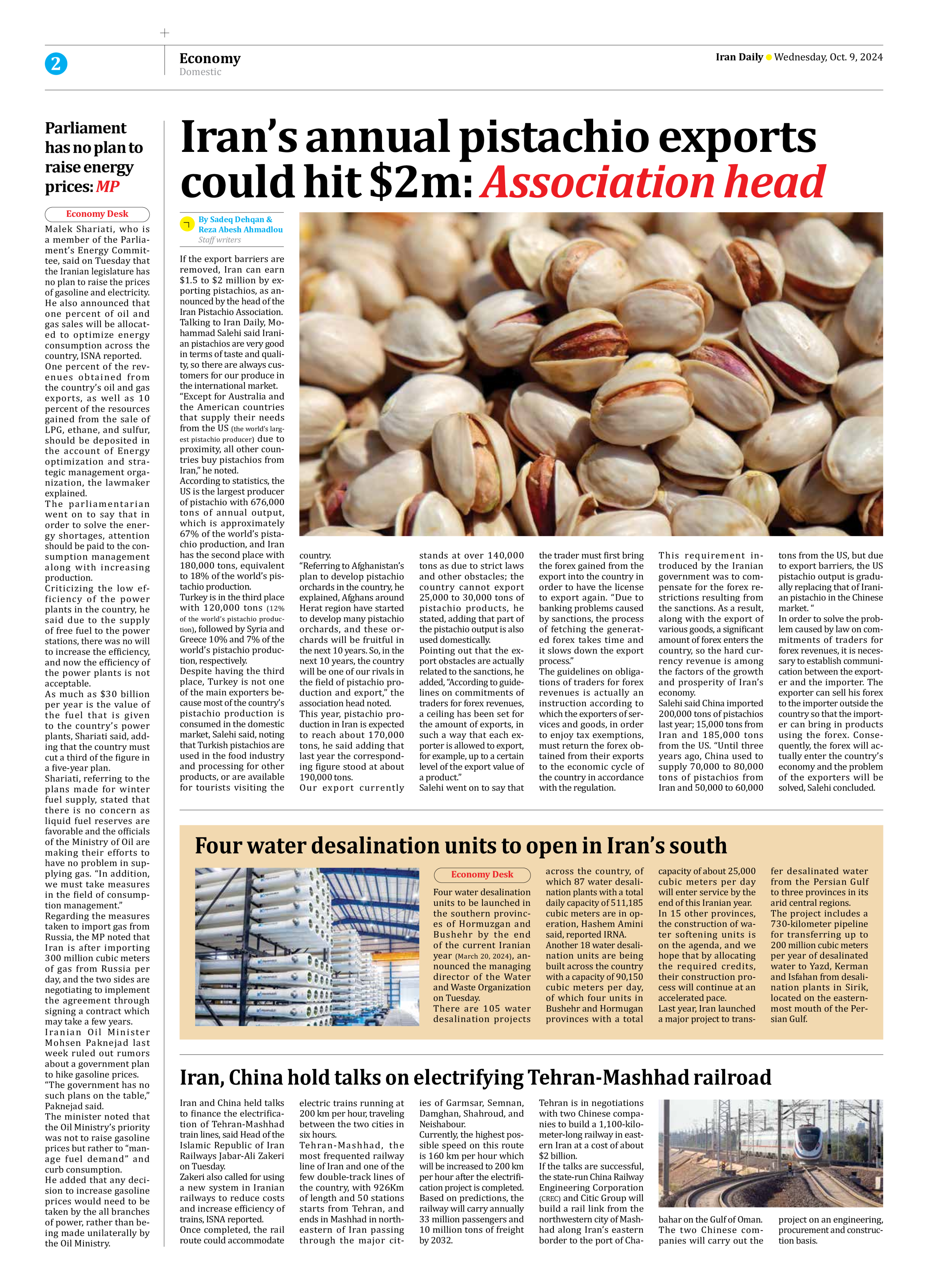
Iran’s annual pistachio exports could hit $2m: Association head
If the export barriers are removed, Iran can earn $1.5 to $2 million by exporting pistachios, as announced by the head of the Iran Pistachio Association.
Talking to Iran Daily, Mohammad Salehi said Iranian pistachios are very good in terms of taste and quality, so there are always customers for our produce in the international market.
“Except for Australia and the American countries that supply their needs from the US (the world’s largest pistachio producer) due to proximity, all other countries buy pistachios from Iran,” he noted.
According to statistics, the US is the largest producer of pistachio with 676,000 tons of annual output, which is approximately 67% of the world’s pistachio production, and Iran has the second place with 180,000 tons, equivalent to 18% of the world’s pistachio production.
Turkey is in the third place with 120,000 tons (12% of the world’s pistachio production), followed by Syria and Greece 10% and 7% of the world’s pistachio production, respectively.
Despite having the third place, Turkey is not one of the main exporters because most of the country’s pistachio production is consumed in the domestic market, Salehi said, noting that Turkish pistachios are used in the food industry and processing for other products, or are available for tourists visiting the country.
“Referring to Afghanistan’s plan to develop pistachio orchards in the country, he explained, Afghans around Herat region have started to develop many pistachio orchards, and these orchards will be fruitful in the next 10 years. So, in the next 10 years, the country will be one of our rivals in the field of pistachio production and export,” the association head noted.
This year, pistachio production in Iran is expected to reach about 170,000 tons, he said adding that last year the corresponding figure stood at about 190,000 tons.
Our export currently stands at over 140,000 tons as due to strict laws and other obstacles; the country cannot export 25,000 to 30,000 tons of pistachio products, he stated, adding that part of the pistachio output is also used domestically.
Pointing out that the export obstacles are actually related to the sanctions, he added, “According to guidelines on commitments of traders for forex revenues, a ceiling has been set for the amount of exports, in such a way that each exporter is allowed to export, for example, up to a certain level of the export value of a product.”
Salehi went on to say that the trader must first bring the forex gained from the export into the country in order to have the license to export again. “Due to banking problems caused by sanctions, the process of fetching the generated forex takes time and it slows down the export process.”
The guidelines on obligations of traders for forex revenues is actually an instruction according to which the exporters of services and goods, in order to enjoy tax exemptions, must return the forex obtained from their exports to the economic cycle of the country in accordance with the regulation.
This requirement introduced by the Iranian government was to compensate for the forex restrictions resulting from the sanctions. As a result, along with the export of various goods, a significant amount of forex enters the country, so the hard currency revenue is among the factors of the growth and prosperity of Iran’s economy.
Salehi said China imported 200,000 tons of pistachios last year; 15,000 tons from Iran and 185,000 tons from the US. “Until three years ago, China used to supply 70,000 to 80,000 tons of pistachios from Iran and 50,000 to 60,000 tons from the US, but due to export barriers, the US pistachio output is gradually replacing that of Iranian pistachio in the Chinese market. “
In order to solve the problem caused by law on commitments of traders for forex revenues, it is necessary to establish communication between the exporter and the importer. The exporter can sell his forex to the importer outside the country so that the importer can bring in products using the forex. Consequently, the forex will actually enter the country’s economy and the problem of the exporters will be solved, Salehi concluded.







